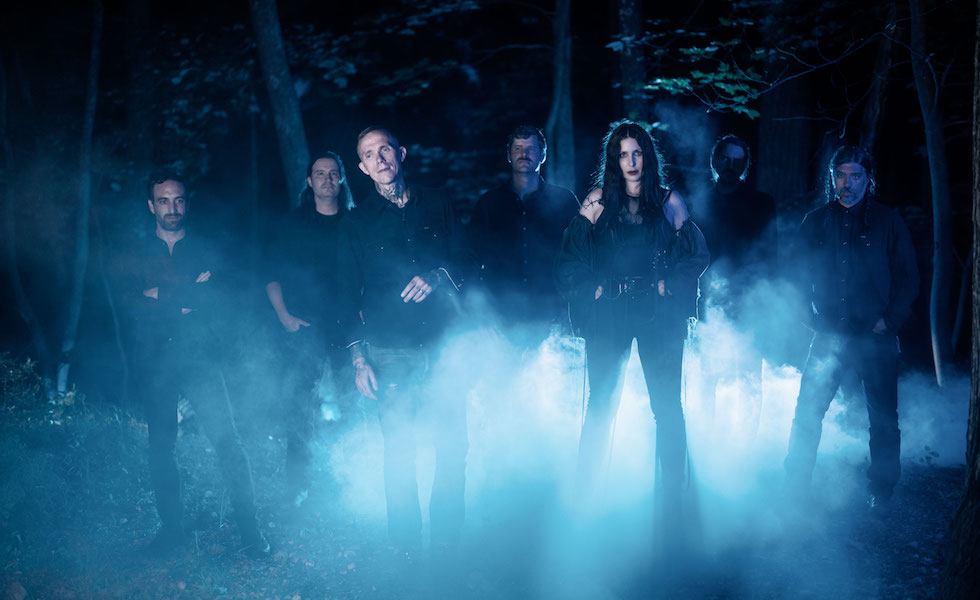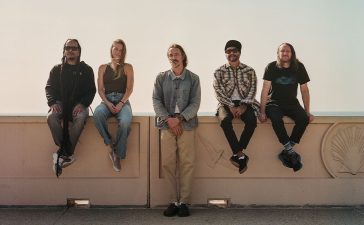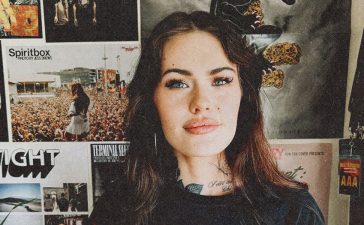Back in 2016, at Netherlands Roadburn Festival, a butterfly flapped its wings, as it were, when two of music’s most powerful forces from seemingly different worlds – Converge and Chelsea Wolfe – collaborated on stage for the first time. Fast forward to 2021, and that flap has developed into a full blown sonic hurricane that is Bloodmoon: I, the debut collaborative album from the two entities, out now via Epitaph.
Bloodmoon: I hits with the same seismic energy as two planets colliding, which is fitting given it’s context. The album is a beaming example that there isn’t one type of darkness, or one type of heaviness; there’s countless and within this experiment, Converge and Chelsea Wolfe have brought forth even more.
Encased by full boxes and other creative paraphilia indicative of a busy mind, Converge frontman Jacob Bannon joined BLUNT for a Zoom call.
Does it help with creating when there’s kind of chaos around you, does that sort of push you over the edge that you need to get to? I can work in pretty much anything.
I mean, you know like my desk is probably like a hundred year old tool bench, you know what I mean? Like nothing’s all that fancy. But I can probably point this out, so like this big pile over here. I have to move that before I can make art. There’s a lot of raw materials in my creative life.
I wasn’t sure what I imagined when I thought about what a Converge office would look like, but raw materials, that tracks; that feels right. Well, yeah. You know, I do most of my work physically, in some way, and then do digital cleanup after the fact.
So there’s always versions of paintings or collage pieces and things that are in constant states of, like of evolution, you know? And so there’s always a lot of paint, a lot of raw materials and drying racks and things, and just things to make it work.
Well, that kind of segways me to the first question about Bloodmoon. Every now and then, one of these albums comes into our space, and they become iconic. They get listened to for decades to come. Throughout the creation process of this, did you ever get any moment to just sit back and enjoy your work? Or were you too busy in the minutia of it all? I definitely enjoyed aspects of it…
It was challenging to put it all together. I think the seven of us all do, but you end up getting tunnel vision, when you’re working on anything creative for a long period of time. And this release, or just this version of our band, it’s been sort of in its primordial stage for about five years, since we did our shows in 2016. We’ve been sharing demos with each other and sharing musical ideas basically since then. So it’s been a long road to get here. We’re all very, just busy people.
To make the logistics work is really challenging, you know, even just the core Converge. So, we’ve been working on this slowly, for a long time. Then it became a bit derailed in terms of the timeline we set for ourselves. We were supposed to be in the studio in March 2020. That obviously got sidelined at the time, and we didn’t know what was going to happen at that point.
The 2016 concerts are now the stuff of folklore. When push came to shove and you actually had to write music for this project. What was that process like? There was no battling at all.
One thing that we all took away from the 2016 shows, was that we all really enjoyed them, and enjoyed each other’s company, and really respected what we all kind of individually brought to the table creatively, as people. And because of that, and because of it being essentially this sort of new grouping of people, there were all these new dynamics that we needed to figure out. And I think, because of that, everybody was very open to each other. You know, we were all open to nearly every aspect of making a record, whereas with a typical, Converge record or something like that, we would probably be a little more iron fisted with certain things. And with this, we weren’t, we were really open and really collaborative.
And I gotta say too, like this, especially this record, everybody wrote everything, so there was so much writing involved. Typically, in a Converge record, my job is a bit autonomous. I bring some riffs to the table. Then everybody else brings riffs and songs, ideas to the table. I’m there for editing, the song structure and songwriting. And then it gets handed off to me for lyrics and titling and phrasing and stuff like that, and it’s a song. With this it was much more fluid than that.
Everybody was writing music, everybody was writing lyrics to a degree, and we’re all editing those things. And so the dynamic there was very different, like I was singing other people’s lyrics, and they were singing my lyrics. It was kind of like all over the place, in terms of who was bringing what to the table. And that’s what made it really exciting for us.
You can’t help but notice the Roman numeral at the end, indicating that potentially this is the start of something. What was going to be the gauge of success, about whether or not this was worth embarking on again, for another round? We don’t check boxes, we just make stuff, and if people connect with it, cool.
You know, if they don’t, that’s cool too. We know as creative people, that we won’t put out anything into the world that we don’t think is our best work, at that given time. So, that’s the way the Converge has always worked. And this version of Converge works that same way.
With that said, we recorded a lot of material in five years. There’s a lot of songs, and what Blood Moon: I is, is what we felt was number one, the most finished songs, at this given time. Also, the songs that worked well together, that showed a lot of the dynamics that this sort of musical character, Converge: Blood Moon, represented. So we put together the debut album.
With that said, we got a lot more material. So, Blood Moon: II Blood moon: III, Blood Moon: IV, if all goes well, we’ll continue down that path, along with proper Converge as well. You know, proper Converge is still very much a thing, and still writing and doing our own thing. And planning shows and tours. This is just another sort of a branch, on our creative tree.










